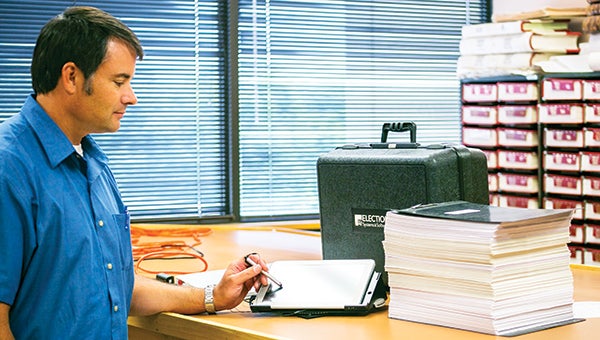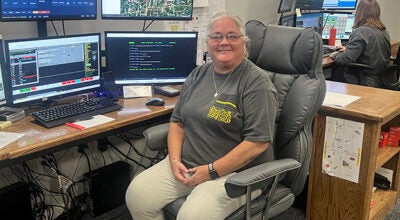County gets electronic poll books
Published 10:03 am Friday, June 26, 2015

Photo by Kaitlin Mullins
Circuit Clerk Dustin Bairfield demonstrates how the poll workers will use the new electronic poll books starting with the Aug. 4 Lincoln County election. The electronic poll books —seen here next to its older, paper counterpart — will save valuable time and taxpayer money by streamlining the process as well as eliminating common human errors.
Cutting-edge voting technology will be used during upcoming elections after Lincoln County received a $35,000 grant to buy electronic poll books.
Lincoln County received 32 tablets to be used at the 31 polling stations with an additional back-up should something happen to one of them. The $35,482 grant also covered software from the Election System and Software company, which also has a contract with the state. In turn, the county did not have to fork over any taxpayer contributions to execute the purchase and set-up of the new system.
Circuit Clerk Dustin Bairfield said that when using the electronic poll books, poll workers need only enter part of a person’s name to search and from there can verify name, address and date of birth. With all the proper voting history and district information digitized in the system, if a voter’s name is not found for that poll station, poll workers can search the entire county and be able to tell the person which of the 31 precincts is the correct precinct to go to. Poll workers and Circuit Clerk office staff could do that before, but it was more complicated, Bairfield said.
“Yes, if we printed the whole county. We always just print the precinct only because [the poll book] is huge,” Bairfield said of the stack of papers over a foot tall and looking to weigh about 50 lbs that is the entire voter roll by precinct. “And you’d have to go through and find you. If I couldn’t find you, I would have to go to each one of these precincts documents and find your name.
“It happens a lot so what we’ve done in the past is tell people just call us and we’ll look it up,” Bairfield said. “So we would have five or six people just answer the phone on election day. So not only will this save a lot of taxpayer money for personnel, it will also save a lot of time because they will [immediately] tell you, you need to go to this voting place.”
Bairfield said that not only does the county save money on paper, but the personnel needed after the election, now eliminated, became very costly.
“At the end of the election it usually takes a week, week and a half, with all of us in the office entering the voter history in the computer,” Bairfield said. “And all it is, is just putting a check beside the person’s name if they voted. That’s how you keep the records maintained. You have to enter your voter history, so we would have to take the poll book, start at each name and the ones who voted we have to check them in the state system.
“And that literally took four or five people, working 8 to 5 for four or five days, and I usually brought in one or two part-time people just to help with that,” he said.
The cost on paper and personnel that the county will save, Bairfield estimated, is approximately $5,000 per election. He said this year alone the county will save up to $15,000 (about half of the cost of the machines) because of the likelihood of a run-off in addition to the Aug. 4 primary and November general election.
“After election, [the electronic poll book] syncs up with our server and within about 15 minutes will have all 31 of the poll books’ voter history,” Bairfield said. “That’s [one of] the main benefits of the books in addition to the books’ ability to show the voter where they need to vote, and program the voter card for the machine.”
Programming the voter card residents use for the polling machine directly on the tablet rather than with what is called an “encoder” is one important benefit. Lincoln and Madison counties are the only two in Mississippi to have the tablets that program the voter cards, with several other counties having slightly less-comprehensive electronic poll books. This ensures that the voter gets the correct ballot, eliminating the human error element of entering numbers on the encoder and making precinct decisions based on color-coded maps.
Bairfield said this will make voting more efficient, with the system administering the correct ballot based on address. This also eliminates the possibility of cross-over voting. When someone decides which party ballot they want to use, the digitized voter history will keep them from switching parties in the event of a run-off.
“The tablet is going to work wonders,” Bairfield said.





